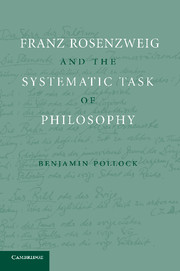Book contents
- Frontmatter
- Contents
- Acknowledgments
- Introduction: The Star of Redemption as “System of Philosophy”
- 1 System as Task of Philosophy: “The Oldest System-Program of German Idealism”
- 2 “A Twofold Relation to the Absolute”: The Genesis of Rosenzweig's Concept of System
- 3 Alls or Nothings: The Starting-Point of Rosenzweig's System
- 4 “The Genuine Notion of Revelation”: Relations, Reversals, and the Human Being in the Middle of the System
- 5 Seeing Stars: The Vision of the All and the Completion of the System
- Conclusion: The All and the Everyday
- Bibliography
- Index
3 - Alls or Nothings: The Starting-Point of Rosenzweig's System
Published online by Cambridge University Press: 28 July 2009
- Frontmatter
- Contents
- Acknowledgments
- Introduction: The Star of Redemption as “System of Philosophy”
- 1 System as Task of Philosophy: “The Oldest System-Program of German Idealism”
- 2 “A Twofold Relation to the Absolute”: The Genesis of Rosenzweig's Concept of System
- 3 Alls or Nothings: The Starting-Point of Rosenzweig's System
- 4 “The Genuine Notion of Revelation”: Relations, Reversals, and the Human Being in the Middle of the System
- 5 Seeing Stars: The Vision of the All and the Completion of the System
- Conclusion: The All and the Everyday
- Bibliography
- Index
Summary
BREAKING UP THE ALL FOR THE SAKE OF THE ALL
The Star of Redemption is a book about the All, about knowing the All. Rosenzweig announces it as such in the title of the book's introduction, “On the Possibility of Knowing the All,” and in the book's first sentence: “All knowledge of the All begins in death, the fear of death.” The Star as a whole recounts the destruction and reconstruction of the All. It narrates for its reader a gripping philosophical drama in which the unity of that which philosophy has taken to be “the All” for 2,500 years first “breaks up” into pieces; in which a “new thinking” forges the path upon which these pieces gradually but deliberately “step into unambiguous, … actual relation with each other” (94/86); in which these relations are nevertheless shown to leave them ever at risk to break apart again, ever at risk to dissolve once and for all into “Nothing” in which, finally, these “pieces of the All which fell apart from each other … are led back together again” (283/254) into an ever more intimate and vital interconnection, culminating in their redemptive reunification as the “true All, the All that does not spring into pieces as in … the Nothing, but rather the one All, the All and One” (428/385).
- Type
- Chapter
- Information
- Franz Rosenzweig and the Systematic Task of Philosophy , pp. 120 - 180Publisher: Cambridge University PressPrint publication year: 2009

